Living in Xinjiang | One Foreigner’s Perspective
For most people who want to study in China, moving and living in Xinjiang is not one of the first things that comes to mind. Why is that? For one, it’s a place that is associated with a number of stereotypes, including stereotypes people have about China as well as prejudice directed toward Xinjiang, which can even be found within China.
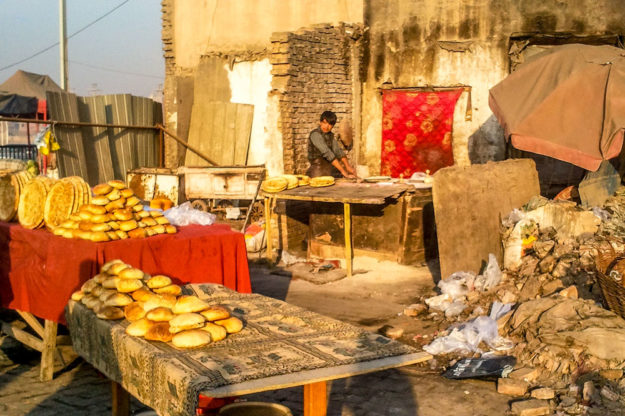
When first I told my friends on the Chinese east coast that I would study in Xinjiang, some reacted with incomprehension, while others were downright alarmed.
Very few friends shared my excitement about moving to Xinjiang.
Despite their doubts, moving to Xinjiang turned out to be one of the best decisions I ever made.
I spent the winter term 2014-15 at Xinjiang University in Urumqi, having previously participated in the Chinese Bridge Competition (a government funded Chinese language competition for university students) and in the course won a Confucius Institute scholarship.
There are a variety of sources for funding, such as Confucius scholarships and Government scholarships, which can be applied to in several ways and have varying deadlines.
If in doubt about funding or logistics, or even the possibility of studying somewhere in particular, get in touch with your university of choice as early as possible. I simply contacted the international centre at Xinjiang University via e-mail, and they were happy to help out.
Living as a Foreigner in Urumqi
In some sense, the Xinjiang capital of Urumqi feels very much like other second tier cities in China: It’s not as polished and fast-paced as Beijing or Shanghai, and the ubiquitous posters praising national solidarity do so with a bluntness that has gone out of fashion elsewhere.

When I arrived to its warm breezy greenness in September, it reminded me a little of Kunming. Autumn blended into a long crisp fairytale winter with snow from October to April, which was spent gorging on an ample variety of Uyghur and non-Uyghur dishes, nuts, fruits and dairy products.
Despite how heavily meat features in Uyghur cuisine, fellow vegetarians are in for a treat. For Muslim students, the easy availability of halal food sets Urumqi apart from other destinations.
Moving around Urumqi, I often found myself being mistaken as Uyghur or belonging to some other minority group. On the bus, I rarely drew attention, and in supermarkets, I was invariably addressed in Uyghur or Chinese.
My assertion that I didn’t know Uyghur was often met with blank incredulity. This was an interesting and somehow liberating experience.
As a white woman, I am used to conspicuous foreigner status in Chinese society. Limited visibility opened up different ways of exploring my role in this new environment.
The only people I was regularly compared to were Josh Summers of Far West China fame and Elise Anderson, an American doctoral student who has appeared on the TV show The Voice of The Silk Road (I didn’t measure up!).
Studying at Xinjiang University
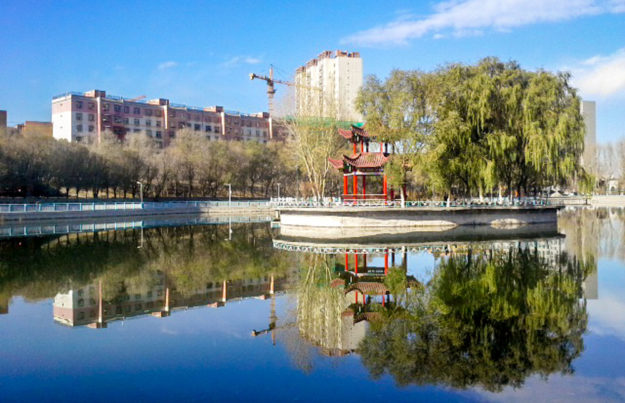
On arrival, I was initially placed in a Chinese language class with other foreign students, but was able to transfer to the MA Modern Literature immediately.
Parts of the MA can be taken in Uyghur, although because I had no previous knowledge, I could not. For the most part, though, I was able to structure my time according to my needs.
In spite of the usual amount of bureaucracy, a lot is possible if you show initiative and keep pestering the relevant people. The International Center encourages students to take part in a variety of competitions and other events, and getting involved in societies (such as sport clubs) is an additional way of meeting people.
I also met a couple of lecturers apart from those teaching me, and on learning of my interest in Uyghur culture, they were extremely supportive, readily sharing their time and advice.
Uyghur Language and Society
Early on, I had made up my mind to get down the basics of Uyghur. I took regular lessons from a Uyghur friend, as well as stopping by the fruit stalls and little shops in order to practice.
However, this did not come anything close to the kind of immersion I find useful for language acquisition. In hindsight, it would have been helpful to strike up friendships with Uyghur families (instead of just classmates) much sooner, as well as, importantly, to start watching TV.
If your degree is taught in Chinese, even if some of your classmates are Uyghur, the language is not automatically part of your everyday life. You have to make it so.
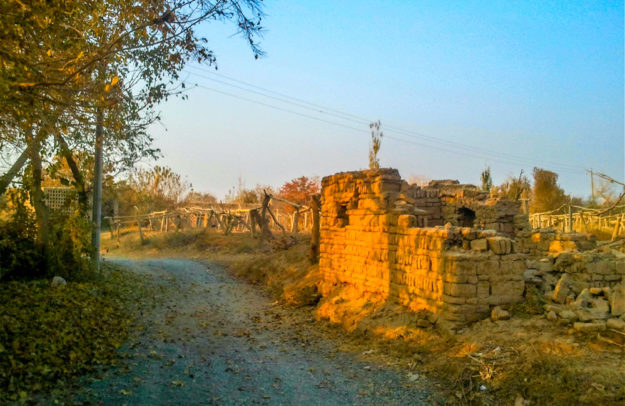
I would also advise you to take private lessons from a lecturer, or to audit the regular Uyghur classes (or simply do a degree in Uyghur – apparently this is still possible). Staying in Xinjiang for longer would, of course, also have been a good idea.
Aside from my abysmal language abilities, I did learn a great deal about Uyghur society. Some of my fondest memories are of staying at my friend’s house in a dusty little village near Turpan, sitting on the kang having black tea and homemade dumplings, her twin baby sisters skipping about excitedly, bombarding me with questions.
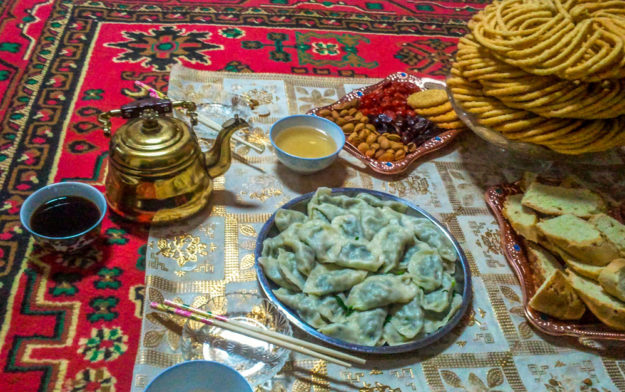
I remember attending a plush Uyghur wedding, and spending hours beforehand getting ready with the bridesmaids; visiting another friend in Kashgar and listening to her recount family anecdotes, while her mother was taking selfies with me on my phone. The surroundings of Xinjiang University’s main campus, which is situated in the Uyghur part of Urumqi, are also worth exploring.
At the same time, remember that Urumqi is home to a vast variety of people, each with different backgrounds, and in order to understand this space, it pays to engage with as many of them as possible – be it your Han classmates, the young Hui couple from Xining who run your favorite shaokao stall, the auntie from Jiangsu selling fruits and vegetables, a taxi driver, a South Korean hairdresser turned missionary, or the Kazakh-Chinese boy crazy about computers whom I used to teach English.
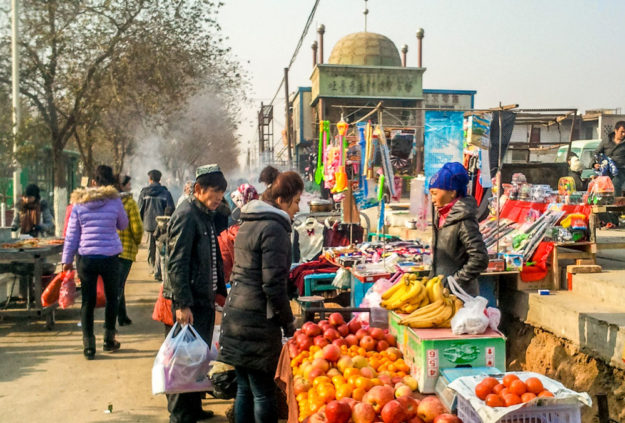
Dormitory Life in Xinjiang University
As is commonplace in China, Xinjiang University requires foreign students to live in a dormitory specially built for them (editor’s note: exceptions to this rule are regularly made).
This is more comfortable than its counterparts intended for local students (there are two- and single-bed rooms, and even special flat-like rooms available for couples) and it is beautifully situated beside the campus lake and park.
Kitchen space and washing machines are shared on each floor. Though it is also possible to live off campus, I imagine that to be a little isolating. The dormitory community with its warm familiarity and spirit of mutual support made me feel at home and exposed me to a wealth of information I would otherwise not have sought out.
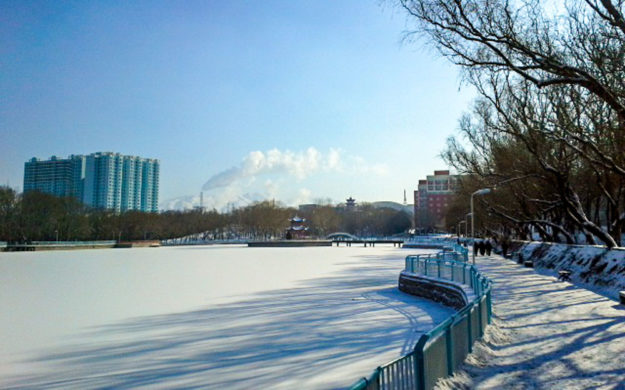
Unlike elsewhere in China, the majority of foreign students are from Central Asian countries, such as Kyrgyzstan and Kazakhstan. This being the case, you get to hear (and, if you wish, practice) several Central Asian languages on a daily basis, but the lingua franca on the corridors is usually Russian.
Several of my friends, including my roommate, were native Russian speakers, and I soon decided to start learning Russian, too. Though I didn’t take formal classes, I made much greater progress with Russian than with Uyghur, undoubtedly due to the environment I lived in.
My new-found enthusiasm for all things Central Asia, and a deep fondness for the Russian language, are some of the unexpected yet much cherished benefits of my stay in Urumqi.
Politics of Living in Xinjiang
The most glaring difference between Urumqi and other places in China is perhaps the fact of living in a partially segregated society, and of being exposed to a small sliver of the policies long-term residents are subject to: Security checks at bus stations, the ban on religious activities for students (which, in my experience, many disregard).
So much has been written on this elsewhere that it seems superfluous to reiterate. I do want to stress that I never felt in danger, like my friends from the East coast expected me to be. On the contrary, I was happy.
One semester is definitely not enough to explore, experience, let alone understand all Xinjiang has to offer. (It is also a shame to miss out on summer!) However, one semester is enough time to gain a layered, complicated first impression, and to form lasting friendships.
If that is what you are looking for, all I can say is: Go for it!
About the Author
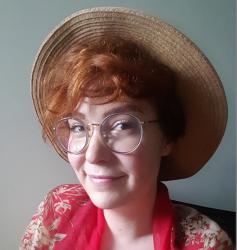
Anna Fee Brunner: Anna Fee studied social anthropology and political science in London. After several stays in China, she feels at home there, but she is equally interested in the Korean peninsula and Central Asia. She co-produces a Chinese language podcast called Quince Poetry (榅桲电台).





